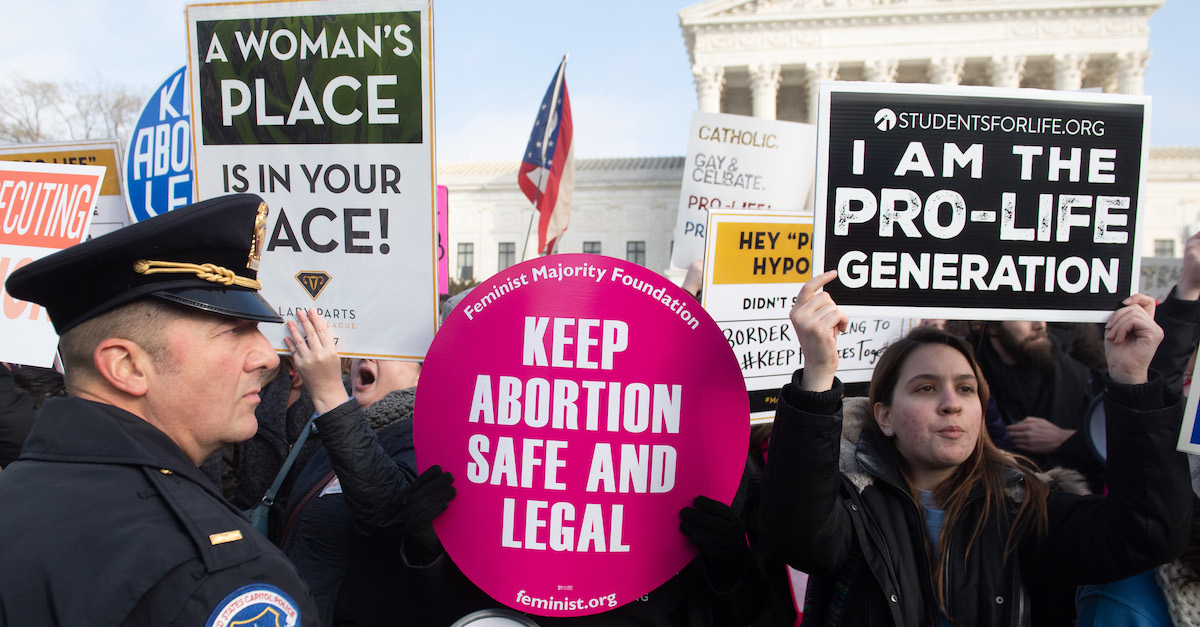
The Supreme Court of the United States on Monday released the oral argument schedule for their fall 2021 term. One of the first cases to be heard is a high-profile challenge to abortion rights out of Mississippi. Stylized as Dobbs v. Jackson Women’s Health Organization, the case concerns the Magnolia State’s currently suspended law that bars women from obtaining on abortion after 15 weeks of pregnancy.
According to the high court’s calendar, the nine justices will hear arguments on the restrictive anti-abortion measure on Dec. 1.
Passed and signed into law in 2018, House Bill 1510, or, the Gestational Age Act, puts an additional burden on all abortion providers as well as any women seeking an abortion.
The law reads, in relevant part:
[A] person shall not perform, induce, or attempt to perform or induce an abortion unless the physician or the referring physician has first made a determination of the probable gestational age of the unborn human being and documented that gestational age in the maternal patient’s chart and, if required, in a report to be filed with the department…
[A] person shall not intentionally or knowingly perform, induce, or attempt to perform or induce an abortion of an unborn human being if the probable gestational age 151 of the unborn human being has been determined to be greater than fifteen (15) weeks.
Small exceptions are reserved for medically-necessary abortions and for pregnancies where “a severe fetal abnormality” is present.
The reporting regime imposed on doctors requires the submission of a form that must be filed with 15 days of performing an abortion “on an unborn human being whose gestational age” is over 15 weeks. That documentation must contain the date the abortion was performed, the specific method of abortion used, the “probable” gestational age of the unborn fetus, a statement declaring that the abortion was necessary to preserve the mother’s life, the specific “medical indications” supporting the abortion in that particular instance and the “probable health consequences” of the abortion method used.
Lower courts have kept the law enjoined while litigation plays out to determine the weighty constitutional issues at stake.
Within 24 hours of the law’s passage, the one and only remaining abortion clinic in Mississippi, the Jackson Women’s Health Organization, sued the state on constitutional grounds.
“The record is clear: States may not ban abortions prior to viability; 15 weeks [after a woman’s last menstrual period (lmp)] is prior to viability; and plaintiffs provide abortion services to Mississippi residents after 15 weeks lmp,” U.S. District Judge Carlton W. Reeves ruled in November 2018. “As the facts establish, the Act is unlawful.”
The rub here comes in the opinion’s next paragraph:
So, why are we here? Because the State of Mississippi contends that every court who ruled on a case such as this “misinterpreted or misapplied prior Supreme Court abortion precedent.”
In court filings supporting their 15-week abortion ban, Mississippi officials have asked federal judges to do away with decades of precedent that keep abortions legal in the United States.
That is, the Dobbs litigation is intentionally keyed toward overturning the landmark Supreme Court cases of Roe v. Wade and Planned Parenthood of Southeastern Pennsylvania v. Casey.
On appeal, the typically conservative Fifth Circuit Court of Appeals declined the southern state’s request.
“States may regulate abortion procedures prior to viability so long as they do not impose an undue burden on the woman’s right, but they may not ban abortions,” Circuit Judge Patrick Higginbotham wrote for a unanimous three-judge panel in November 2019.
Now, nearly two years later, the 6-3 conservative majority on the nation’s highest court will have an opportunity to roll back abortion rights.
Dozens of supporting briefs have been filed with the Supreme Court by proponents and opponents of the Mississippi abortion ban.
“The fallout would be swift and certain. As abortion bans are enforced—or the threat of enforcement looms—large swaths of the South and Midwest would likely be without access to legal abortion,” attorneys representing the state’s sole abortion provider recently warned. “Fear of arrest or prosecution could deter those who then need medical help from seeking it, endangering their health and safety.”
Religious conservatives have long awaited the prospect of overturning the Roe and Casey precedents. Another recent filing invoked Bob Dylan’s Christian music period and decried the use of so-called “pagan” law.
The American Civil Liberties Union was one of several moving parties who filed amicus motions on Monday.
“The right to decide to have an abortion is firmly grounded in, and is an indispensable part of, the liberty to make fundamental decisions about the most intimate aspects of one’s own life and body,” attorneys for the storied civil liberties organization wrote. “These include the rights to decide to use contraceptives, to decide whether and whom to marry, to decide whether to have children and how to raise them, and to bodily integrity.”
[image via Image via SAUL LOEB/AFP/Getty Images]
Have a tip we should know? [email protected]